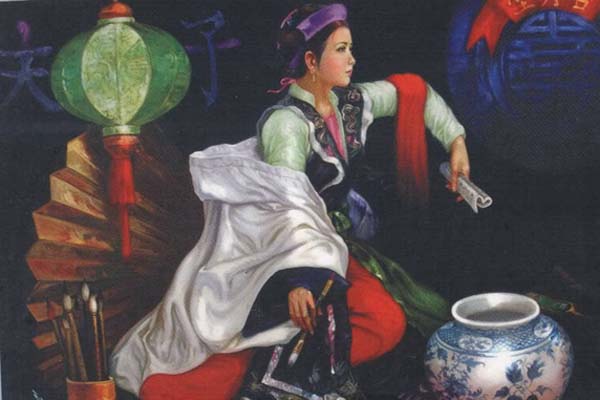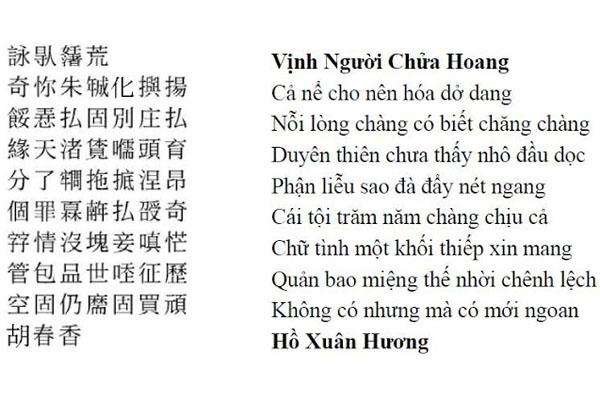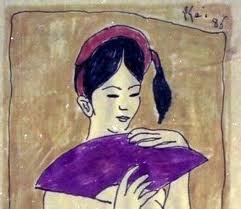The name of Ho Xuan Huong explodes like fireworks in classical Vietnamese literature. She is its’ enfant terrible". Ho Xuan Huong has her place apart.
Apart as a woman claiming her right to carnal love in the face of feudal prudishness.
Apart as a writer battering and breaching the rules and habits which still enchained Vietnamese literature to Chinese prescriptions.
In the XVIIIth century, a troubled period, she exposed with noteworthy talent and skill false scholars, ignorant bonzes, wanton and corrupt mandarins, and a whole conservative ruling class devoted to Confucian principles which she holds up to merciless ridicule.
And she does it in 'nom’ the Vietnamese script which transcribes the national language rich in popular expressions.
Nevertheless, it is only after 1954 and especially after 1969 that Ho Xuan Huong’s case has been studied systematically in the North of Vietnam.

How could it have been otherwise? For years, where were the men, and among them intellectuals, critics and poets?
In the forests, fields, marquis and among the partisans in town.
Open sky grey as ash
two rows of deserted houses
Hanoi bleeds, backbone of steel,
hands hungry for gun and for grenades.
human eyes like swords.
flash in the long night’s wait.
(Nguyen Dinh Thi, 1949)
That was a time of daily struggle, grey, with a thorn of steel in the heart.
Arduous struggle, exhausting. Atmosphere of forced asceticism.
It was hardly a time for poetic exegesis.
Not only did material conditions become better after 1954, but a real intellectual life became possible, especially in the totally liberated North of the country, the creation of new means of research, new libraries, and the development of publishing, the press, and the reading public... Around 1959 and at the beginning of the 1960's, a debate on Ho Xuan Huong began at the University and in the literary magazines.
Rare is the poet who masters the language better than Ho Xuan Huong.
If she maintains the scholarly form, it is to fill it with the popular language that corresponds to her soul...
Rare is the poet who masters the language better than Ho Xuan Huong.
If she maintains the scholarly form, it is to fill it with the popular language that corresponds to her soul.
Ho Xuan Huong uses nom at a time when the latter was almost as difficult to write as Chinese characters, but had the great advantage of conveying the popular literature.
We have seen above that her satirical and erotic inspiration makes her join the popular tradition of saucy stories, ca dao and proverbs.
But the composition of her poetry remains classical.

Whereas the popular poetry very often adopts the prosodic form of the alternation of a 6-foot line and an 8-foot line, Ho Xuan Huong resorts to the Tang poem structure of octets or quatrains composed of 7-foot lines.
In such a poem, the 3rd and 4th lines as well as the 5th and 6th lines are "parallel”.
Parallelism also in the form: a noun corresponds to a noun, an adjective to an adjective, an adverb to an adverb... as is seen in parallel sentences. There is also parallelism in content: color, shape, tone, etc... This parallelism which can easily fall into an affected style creates an incantatory effect.
Ho Xuan Huong is a magician for the choice of words. For her words have shapes and colors. She is both a painter and a sculptor but she never expresses anything in a static manner.
She admirably handles onomatopoeia, imitating the regular sound of the drop falling in the grotto, of the squall shaking the pine branches.
She goes beyond the pure imitation of a sound to reach the rhythm itself.
If the form is erudite, the language is so pure and so simple that the lower class people, even the illiterate, can understand her poems.
Ho Xuan Huong is the “Queen of the Nom" of Vietnamese literature in the mother tongue. Chinese literary allusions and mythological references are rarely found in her work. On the other hand, her poem is adorned with "ca dao" and popular proverbial sayings that come from the very soil of Vietnam.
Ho Xuan Huong's art symbolizes the synthesis of two poetic currents which have been formed over the centuries: popular poetry and scholarly poetry - as does the art of Nguyen Du, the immortal poet of Kim Van Kieu.
Ho Xuan Huong's great voice, sarcastic and quivering, enthusiastic and tender, will resound forever.
For all Vietnamese, men and women alike, Ho Xuan Huong is more than a poet. She is the symbol of independence of mind and heart, of courage and struggle against hypocrisy, constraint, social constraints and taboos. No one has had more sense of justice, of the fullness of love, consciousness of the woman's dignity.



